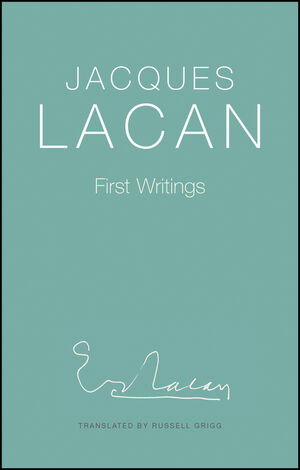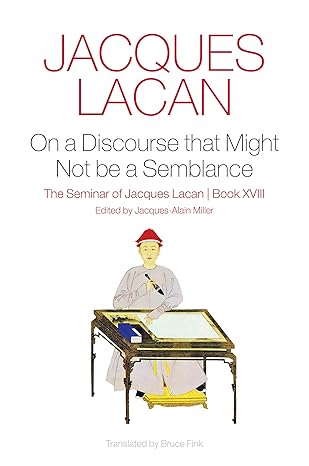Jacques Lacan

Jacques Lacan (1901-1981) came to psychoanalysis by way of medicine and psychiatry. In 1951 he turned his attention to the training of analysts, and this was one of the issues which led him and his circle to part company with the Société Psychanalytique de Paris. He became, in 1953, the first President of a new group, the Société Française de Psychanalyse, whose declared aim was a return to the true teaching of Freud. Eleven years later the Société Française was dissolved and, under Lacan's direction, gave birth to the École Freudienne de Paris. Jacques Lacan was a practising psychoanalyst and teacher up until his death in 1981.
The Seminar of Jacques Lacan XV: The Psychoanalytic Act
From unedited French manuscripts (more)
The Seminar of Jacques Lacan XII: Crucial Problems for Psychoanalysis
From unedited French manuscripts
The Seminar of Jacques Lacan IX: Identification
From unedited French manuscripts (more)
The Seminar of Jacques Lacan XIV: The Logic of Phantasy
From unedited French manuscripts (more)
The Seminar of Jacques Lacan XIII: The Object of Psychoanalysis
From unedited French manuscripts
Jacques Lacan: Family Complexes in the Formation of the Individual
From unedited French manuscripts
The Seminar of Jacques Lacan: The Knowledge of the Psychoanalyst 1971-1972
From unedited French manuscripts
The Seminar of Jacques Lacan XX: Encore
From unedited French manuscripts. (more)
The Seminar of Jacques Lacan XVIII: On a Discourse that Might not be a Semblance
From unedited French manuscripts (more)
The Seminar of Jacques Lacan VIII: Transference
From unedited French manuscripts
Television: A Challenge to the Psychoanalytic Establishment
The main text is a transcript of a provocative filmed interview with Lacan. The interviewer, J-A Miller, poses questions often asked by those outside the Lacanian mileau. The second half contains... (more)
First Writings
Before he became an analyst, Lacan was a psychiatrist. The articles in the present volume would not be being republished if they didn’t invite us to read them retroactively. What can they teach us... (more)
The Seminar of Jacques Lacan XXIII: Joyce and the Sinthome 1975-1976
From unedited French manuscripts. (more)
The Seminar of Jacques Lacan I: Freud's Papers on Technique, 1953-54
Includes discussion of the role of the imaginary, resistance, the ideal ego and ego ideal, and the function of speech in psychoanalysis.
The Seminar of Jacques Lacan V: The Formations of the Unconscious
From unedited French manuscripts
The Seminar of Jacques Lacan VI: Desire and its Interpretation
From unedited French manuscripts
The Seminar of Jacques Lacan XVII: Psychoanalysis Upside-Down
From unedited French manuscripts (more)
Ecrits: The First Complete Edition in English
Brilliant and innovative, Jacques Lacan's work lies at the epicentre of modern thought about otherness, subjectivity, sexual difference, the drives, the law and enjoyment. This new translation of his... (more)
On the Names-of-the-Father
What astonishing success The Name-of-the-Father has had! Everyone finds something in it. Who one's father is isn't immediately obvious, hardly being visible to the naked eye. Paternity is first and... (more)
The Triumph of Religion
'I am the product of priests', Lacan once said of himself. Educated by the Marist Brothers (or Little Brothers of Mary), he was a pious child and acquired considerable, personal knowledge of the... (more)
...or Worse: The Seminar of Jacques Lacan, Book XIX
"A chance meeting of a sewing machine and an umbrella. The impossible face-off between a whale and a polar bear. One was devised by Lautréamont; the other punctuated by Freud. Both are memorable. Why... (more)
The Sinthome: The Seminar of Jacques Lacan, Book XXIII
'Ten times, an elderly grey-haired man gets up on the stage. Ten times puffing and sighing. Ten times slowly tracing out strange multi-coloured arabesques that interweave, curling with the meanders... (more)
Desire and its Interpretation: The Seminar of Jacques Lacan Book VI
What does Lacan show us? He shows us that desire is not a biological function; that it is not correlated with a natural object; and that its object is fantasized. Because of this, desire is... (more)
Talking to Brick Walls: A Series of Presentations in the Chapel at Sainte-Anne Hospital
'I've been talking to brick walls,' says Lacan, meaning: 'Neither to you, nor to the Big Other. I'm speaking by myself. And this is precisely what interests you. It's up to you to interpret me.' ... (more)
The Seminar of Jaques Lacan Book XVII: The Other Side of Psychoanalysis
Revolutionary and innovative, Jacques Lacan's work lies at the epicentre of modern thought about otherness, subjectivity, sexual difference and enjoyment. This new translation of Lacan's deliberation... (more)
The Seminar of Jacques Lacan XVI: From an Other to the Other
From unedited French manuscripts (more)
The Seminar of Jacques Lacan X: Anxiety
From unedited French manuscripts
On Feminine Sexuality, the Limits of Love and Knowledge - Encore 1972-1973: Seminar XX
An annotated translation of Jacques Lacan's seminar weighing up theories of the relationship between the desire for love and the attainment of knowledge. The text draws upon the work of such diverse... (more)
On a Discourse that Might not Be a Semblance: The Seminar of Jacques Lacan, Book XVIII
The title is, at first glance, enigmatic. Clue: it concerns men and women—their most concrete, amorous, and sexual relations in everyday life, as well as in their dreams and fantasies. It has nothing... (more)
From an Other to the other, Book XVI
Sollers once wrote that, to him, Claudel was first and foremost the man who wrote, “Paradise is around us at this very moment, all its forests attentive like a great orchestra that invisibly adores... (more)































